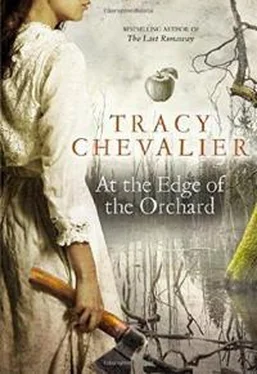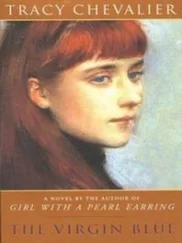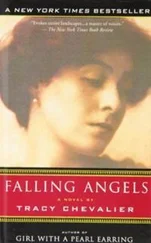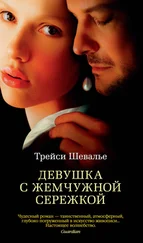Exeter
England
Use Adams Express, on my account. When you ship specimens, always send me two notes-one on the ship carrying the cargo, the other separately on a different ship-to alert me of their arrival.
Yours faithfully,
William Lobb
He sat for a long time, rereading the letter and studying the list of trees. Lobb had not asked him if he would collect for him, but simply assumed he would. That assumption did not bother Robert. Given the choice between the aimless sort of existence he’d had the last few years, picking up farming and ranching here and there, and collecting trees for an employer, there was no doubt which he would choose. And he was flattered that William Lobb felt he was up to the job-indeed, had spent the last several days training Robert.
He smiled to himself. He was becoming a tree agent.

For over a year Robert collected for William Lobb without hearing a word from him. He worked hard to gather the quantities demanded in the letter, traveling in a wide radius around San Francisco, making another trip to Calaveras Grove-hiring mules to bring the sacks back to the city-and going north for the first time to the Oregon mountains. The gray finally resigned himself to climbing and carrying sacks of cones, though he still kicked and bit when his owner tried to hang pails of seedlings on him, and Robert had to devise leather pouches to put them in instead.
It turned out plant collecting was a solitary occupation. In the past Robert had enjoyed being alone, or so he thought. Actually he had rarely been alone for long: working in hotels, in stables, on ranches and farms, and as a miner, he had always been around others. Now, out in the woods or up in the hills or out on the flat central plain, he could go for days without speaking to anyone. His throat seemed to close up and he had to keep clearing it, singing songs aloud or reciting the Latin names of plants, just to check that he still had a voice. Araucaria imbricata. Sequoia sempervirens. Pinus lambertiana. Abies magnifica. He was surprised at how much he missed people. Sometimes he deliberately sought out miners’ camps, just to sit with others around a fire. When he needed familiarity, he went back to San Francisco so that he had Mrs. Bienenstock to talk to-or at least to be around, as she was more a grunter than a talker. Robert did not say much either, but they sat in the kitchen together, reading the newspaper, or out on the steps of the house, where she smoked her cigar and he watched passersby. Once she offered him a cigar and he made the mistake of inhaling. She chuckled about it for a week.
By the following spring he had collected and packed and sent three shipments of specimens and seeds, ticking off everything in Lobb’s letter. He didn’t know what to do then, and asked Mrs. Bienenstock. She didn’t even look up from mopping the kitchen floor, cigar clamped between her teeth. “Do it all over again.” So he did.
His next round of collecting was what brought him riding down a Sacramento street on a late spring day just as the sun came out from behind a cloud and lit up a woman in a yellow dress. She was standing by a wagon and watching as men loaded it with sacks of flour. Robert pulled up the gray with a start at the sight of Molly Jones.
Robert had met Molly five years before on a Texas ranch where she worked as a cook, with a side line in prostitution. She seemed equally at home in both roles, though she never called herself a whore. Sleeping with men was just another task, like scrubbing pots or gutting chickens. Robert had even seen her pause in the middle of preparing a pot of stew to step into the pantry with a cowboy and lift her skirts.
Molly had curly black hair, wide blue eyes, a substantial bosom and a cheerfulness that did not always match her circumstances. Robert had seen her continue smiling as she passed a corpse by the side of the road or after a customer gave her a black eye. “Robert Goodenough,” she repeated the first time she heard his name. “Now I am sure that ain’t right. I’m gonna have to check jest how good you are !” And she did, that night, finding him and leading him back to her room, which had the most comfortable bed on the ranch, and relieving him of his ignorance of women. Her bosom smelled like bread. “First one’s free,” she said afterwards, lying along her arm and smiling. “You can go now, honey,” she added as Robert sat on the side of the bed, hands hanging between his knees, unsure of the etiquette. Molly was helpful like that.
For a week Robert was in love with her, with her yeasty smell, her frizzy hair that would not stay in a bun, her lips a dark red like she had just been eating blackberries. Really he was in love with being so close to a person that you were actually inside their body. He could not get enough of that feeling, and visited her bed three more times that week. Between bouts they would lie in bed recovering, and Molly would ask him about his past. Robert dodged the difficult questions, said nothing about why he had left Ohio, about having to grow up fast, about being cold and hungry and tired most of the time. If he did not talk about it, he did not have to think about it, and could keep a dark curtain pulled shut between then and now. Instead he entertained her with funny stories about Jonah Parks, the charlatan medicine man he’d worked for in Indiana, like the time they went to jail after Jonah Parks stole a wooden leg and accidentally tried to sell it back to the owner. Molly loved that story.
She was more forthcoming about her own past: a childhood in Georgia, a mother dead in childbirth, a drunk father, a brother and sister killed by Indians while Molly hid in a haystack and watched. “You got to smile,” she said. “Otherwise you’d cry all day.”
After the fourth bedding, Molly took his money and said, “No more for a while, or you’ll run through your pay, with nothin’ to show for it at the end.” It was her way of warning him off feeling more for her than he should, and Robert knew she was right. He still went to bed with her occasionally, but he did not try to get to know her better.
Sometimes, though, when he was wrapped in his blanket during a starless night, or chasing the horizon across an endless plain under the brutal Texan sun, he remembered the dazed feeling he’d had during that feverish week of love, riding among the cattle with the sensation that everything in the world-every scrubby plant, every outcrop of rock, every cow and horse and man and cloud-all connected up along a path that led back to one woman, standing in a kitchen making biscuits. While he was feeling it he had not thought he could ever feel any other way. Once it was gone, though, he wondered how something so strong could fade to a ghostly trace, like a river that had flooded but now dried to a trickle, leaving behind only a flood mark of debris. For the feeling did fade, Molly became just another worker at the ranch, and when Robert left for California, he said goodbye to her as if they had barely met and certainly not shared a sweaty bed. For her part, Molly remained buoyant. “Maybe I’ll go to Californie too,” she said. “Find me some gold and put my feet up. That’d be the life, wouldn’t it? Maybe I’ll do that.”
It seemed she had done what she’d threatened. Robert sat on the gray on the Sacramento street and studied her. Molly was thinner now and more weathered-crossing America did that to a face-but still looked cheerful. She was turned away from him, and he could have ridden past and pretended their paths hadn’t crossed, and never seen her again. He thought about it, and then he called her name.
Читать дальше








![Трейси Шевалье - Тонкая нить [Литрес]](/books/386177/trejsi-shevale-tonkaya-nit-litres-thumb.webp)




